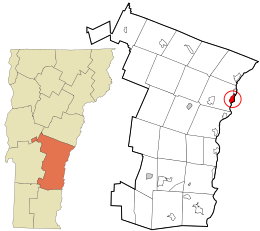White River Junction, VT
| White River Junction, Vermont | |
|---|---|
| Census-designated place | |

White River Junction railroad station
|
|
 Location in Windsor County and the state of Vermont. |
|
| Coordinates: 43°39′1″N 72°19′17″W / 43.65028°N 72.32139°WCoordinates: 43°39′1″N 72°19′17″W / 43.65028°N 72.32139°W | |
| Country | United States |
| State | Vermont |
| County | Windsor |
| Area | |
| • Total | 1.7 sq mi (4.4 km2) |
| • Land | 1.6 sq mi (4.3 km2) |
| • Water | 0.0 sq mi (0.1 km2) |
| Elevation | 361 ft (110 m) |
| Population (2010) | |
| • Total | 2,286 |
| • Density | 1,300/sq mi (520/km2) |
| Time zone | Eastern (EST) (UTC-5) |
| • Summer (DST) | EDT (UTC-4) |
| ZIP codes | 05001, 05009 |
| Area code(s) | 802 |
| FIPS code | 50-83575 |
| GNIS feature ID | 1460224 |
White River Junction is an unincorporated village and census-designated place (CDP) in the town of Hartford in Windsor County, Vermont, United States. The population was 2,286 at the 2010 census, making it the largest community within the town of Hartford.
The village includes the White River Junction Historic District, a historic district that is listed on the National Register of Historic Places in 1980 and whose boundaries were increased in 2002. The historic district reflects urban architecture of the area from the late 19th century and early 20th century. The district is bounded by the Central Vermont railroad tracks, Gates Street, and South Main Street. It includes at least 29 contributing and non-contributing buildings. Notable buildings include the Coolidge Hotel, the First National Bank building, a U.S. Post Office building, and the White River Junction Fire House, showing examples of Greek Revival, Colonial Revival, Richardsonian Romanesque, Italianate and Romanesque architecture.
The village has long had a role in transportation, primarily as a railroad junction. From the arrival of the first railroads in the late 1840s until rail diminished in importance in the 1960s due to the Interstate Highway System, White River Junction was the most important railroad community in Vermont. Its original importance was due to its location at the confluence of the White River with the Connecticut River. In 1803 Elias Lyman built a bridge across the Connecticut from the north bank of the White River to West Lebanon, New Hampshire.
...
Wikipedia
